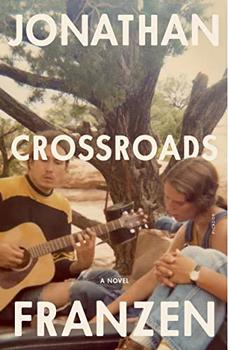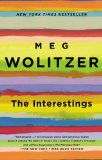Summary | Excerpt | Reading Guide | Reviews | Beyond the book | Read-Alikes | Genres & Themes | Author Bio

A Key to All Mythologies #1
by Jonathan FranzenJonathan Franzen's Crossroads transports readers to the early 1970s, introducing us to a family on the cusp of change. Patriarch Russ Hildebrandt, once a popular and commanding figure with lofty ideals, is now an associate pastor in suburban Illinois and intensely discontented with his life. He's been supplanted at his church by a new, hip youth minister; he resents being tied to his wife Marion, whom he finds repulsive; and his children despise him. Entering this whirling mass of dissatisfaction comes a beautiful, newly-widowed parishioner who seems to promise deliverance. Marion, for her part, is also unhappy; she's gained a lot of weight and knows her husband barely tolerates her presence. She's also not blind to his attentions to other women, and she longs for the attractive, forceful woman she used to be. Their oldest child, Clem, due home from college for the holidays, has developed a sense of moral certitude that leads him to make a life-altering decision he knows his father will oppose and (rightly) take personally. A self-centered high school senior, Becky seems to care only for her status as school "royalty." Fifteen-year-old Perry, easily the smartest of the lot, has a budding career as a drug dealer. And lastly, Judson, at eight, is mostly left on his own to observe his family crumbling around him. Each makes a decision on Christmas Eve that will propel them in different, unforeseen directions.
Franzen has won wide acclaim for his excellent characterization, but he has raised the bar with Crossroads. As the story unfolds, the chapters alternate points of view so that each of the Hildebrandts is fully represented (with the exception of the youngest, Judson). Readers get to know each of them in-depth, learning their most intimate fears and desires, and through seamlessly inserted flashbacks we view formative events in their pasts as well. Shifting the focus from one character to another allows readers to see how the family members perceive each other, providing more comprehensive portraits. Pivotal events are relayed from multiple perspectives, giving readers a richer understanding of what really happened and how each character is impacted.
Each Hildebrandt is delightfully multi-layered, but Russ and Marion in particular are incredibly complex creations. It's fascinating, for example, to contrast the young and idealistic Russ with the truly loathsome person he becomes. While readers might find his actions in the book's present unconscionable, because we're familiar with his past, we're nonetheless able to have sympathy for him. We recognize his need to regain his sense of self-worth while at the same time knowing that his cringe-worthy actions will only make matters worse. And following Marion's journey over the course of the book is a joy — perhaps the highlight.
With the narrative's emphasis being so heavily on characterization, the plot doesn't have much forward motion until somewhere around the midpoint. Even then, there's nothing terribly remarkable about the story; for the most part it describes a relatively normal family experiencing the trials many encounter, such as questions of marital happiness and fidelity, the realization that one's life hasn't turned out as imagined, and adolescent rebellion against convention. By that point in the book, though, we're so heavily invested in these people that we're compelled to keep turning pages to learn where their individual crises will take them.
The author, obviously a child of the '70s himself, imbues his story with cultural references specific to that era. It made me smile as I encountered mentions of something common then that has since been supplanted by technology — things like writing a letter to someone, using a paper map to navigate, or taking pictures with a clunky camera that relies on film. Allusions to current events such as the Vietnam War and Watergate further set the narrative firmly in a specific time period. Those like myself who remember the '70s will likely enjoy the trip down memory lane, while younger readers may get a kick out of this "ancient history." In addition to these references, though, Franzen brilliantly captures the cultural shifts that began in the 1960s and reached a peak in the 1970s — particularly with young people increasingly rejecting the values held by their elders.
The novel is the first entry in Franzen's A Key to All Mythologies trilogy, and it's helpful that readers are warned up-front that there's more story in the pipeline, as the conclusion is rather open-ended. There is an extended epilogue, but it doesn't resolve the plotlines as much as indicate a direction they may take down the road. While reasonably satisfying, it still left me hungry for more; hopefully the next book will be released before readers' interest in and empathy for the Hildebrandts wanes overmuch.
I thoroughly enjoyed Crossroads start to finish, and highly recommend it to anyone interested in a beautifully written, character-driven trip back in time. Its adult themes (drug use, adultery, rape and abortion, among others) make it inappropriate for younger audiences, but those topics plus an emphasis on discussions of faith make it an excellent choice for book groups.
![]() This review was originally published in The BookBrowse Review in October 2021, and has been updated for the
October 2022 edition.
Click here to go to this issue.
This review was originally published in The BookBrowse Review in October 2021, and has been updated for the
October 2022 edition.
Click here to go to this issue.

If you liked Crossroads, try these:

by Melanie Benjamin
Published 2024
Two sisters navigate the thrilling, euphoric early days of California surf culture in this dazzling saga of ambition, sacrifice, and the tangled ties between mothers and daughters.

by Meg Wolitzer
Published 2014
The Interestings explores the meaning of talent; the nature of envy; the roles of class, art, money, and power; and how all of it can shift and tilt precipitously over the course of a friendship and a life.
Your guide toexceptional books
BookBrowse seeks out and recommends the best in contemporary fiction and nonfiction—books that not only engage and entertain but also deepen our understanding of ourselves and the world around us.